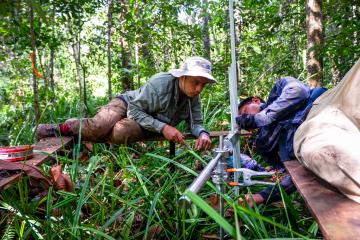
Earth Day 2021: Evaluating the state of evidence in climate action and poverty alleviation

Earth Day presents an opportunity for citizens, policymakers, and the private sector alike to take stock of the state of our planet and our progress in fighting climate change. However, we cannot evaluate the impact of climate change without also acknowledging its disproportionate impact on vulnerable populations, particularly people experiencing poverty.
Since last Earth Day, the Covid-19 pandemic has underscored the inequality of existential threats. Many in low- and middle-income communities are already feeling the harmful effects of climate change. As we assess our ability to combat climate change and the solutions we’ve developed thus far, we must bear this in mind and prioritize solutions that effectively reduce emissions while addressing disproportionate impacts for people living in or at risk of falling into poverty.
The state of the planet and impact on low-income communities
The year 2020 corresponded with an unprecedented decline in CO2 emissions, in part as a result of global lockdowns. However, as economies begin to reopen, this drop is already proving to be temporary, with emissions two percent higher in December 2020 than they were in December 2019.
Although greenhouse gas emissions are predominantly emitted by high-income countries, the impacts will be felt most strongly by people in low- and middle-income countries. Fortunately, there has been a significant increase in recent commitments to reach net-zero emissions from both corporations and governments. While these commitments are essential, they must translate to meaningful climate action.
In order to address climate change and help governments and corporations achieve their commitments to net-zero emissions, corresponding and effective policy solutions are needed.
Focusing on evidence-informed solutions
Although it’s easy to feel daunted by the manifestations of climate change since last Earth Day, we need to keep an eye on the future and focus on evidence-informed policy solutions. For innovations to effectively combat climate change and address poverty and disproportionate impacts of climate change, they need to be tested in real-world settings.
While there is much research that still needs to be conducted in this space, there are also existing evidence-informed solutions that can or already have helped inform policy decisions.
Mitigation
In order to mitigate climate change, we must urgently reduce greenhouse gas emissions, and solutions that reduce emissions at the lowest cost per ton are needed for the greatest impact. Reducing and avoiding deforestation presents one opportunity to abate emissions. A randomized evaluation in Uganda, for example, examined the effectiveness of a Payments for Ecosystem Services program, which paid landowners not to cut down trees. The evaluation found that deforestation declined, and CO2 emissions were abated at less than US$1 per ton delayed from entering the atmosphere. While this evaluation examines the impacts of just one small-scale program, it has great potential to scale in other settings given the demonstrated cost-effectiveness.
Pollution
Activities that produce greenhouse gas emissions also produce local pollutants which have harmful impacts on human health and the environment. Local pollutants often disproportionately impact low-income communities, who are more likely to live near sources of pollution. Balancing this inequality by lowering air pollution and improving respiratory health is even more important in the face of respiratory viruses, like Covid-19. This was of particular concern in India, which struggles with some of the worst air pollution globally. One solution that has already been scaled in Gujarat, India is improving third-party audits by changing incentives for industrial pollution auditors.
Adaptation
Many are already experiencing the effects of climate change—spotlighting the need for strategies to improve resilience to climate change for vulnerable populations. In low- and middle-income countries, the income and agriculture outputs of smallholder farmers are particularly vulnerable to extreme weather events. The adoption of new technologies can be a helpful solution. One example of this occurred in India, where researchers evaluated the impact of flood-tolerant rice. Adoption of the new rice variety reduced risk and encouraged additional investment in smallholder farms, resulting in increased yields and resilience to climate shocks.
These results offer promising guidance for similar programs in other rice-growing countries.
Energy efficiency
Ensuring that energy use is efficient is essential to a low-carbon future. To promote energy conservation in the United States, researchers evaluated the impact of home energy reports on energy conservation. The evaluation found that receiving reports led to reduced household energy consumption. Initially, energy savings were driven by immediate response to the report, but eventually, households made long-term changes to energy consumption habits even after they were dropped from the program after two years. Based on these findings, home energy reports may have the potential to scale in similar contexts and further contribute to increasing energy efficiency.
Looking to the future
These demonstrated solutions are significant steps for evidence-informed policy addressing the global climate challenge, and more research is underway. J-PAL affiliated researchers are evaluating an array of interventions to address climate challenges and its effects on vulnerable populations, from reducing emissions through increased ride-sharing, to the adoption of off-grid solar power among small retailers, to rainwater harvesting techniques for small scale farmers.
However, many popular climate technology and policy solutions have not been evaluated in the real world to measure their impacts on emissions and people's lives. Although there is much evidence on the impacts of climate change and abundant promise in technological innovations, more research is needed for decision-makers to scale solutions that are effective in real-world settings.
To address this, the King Climate Action Initiative (K-CAI) at J-PAL is dedicated to designing, piloting, evaluating, and scaling innovations that not only tackle climate change but benefit people living in poverty. Through K-CAI, our focus will remain on developing climate solutions with demonstrated effectiveness that address both the urgent need to reduce global emissions and protect low- and middle-income communities.
To stay up to date on environment, energy, and climate change policy solutions and research, subscribe to our mailing list and mark “Environment & Energy” as a sector interest area.



